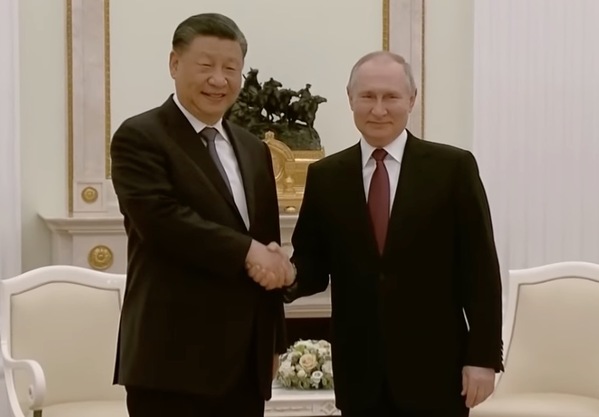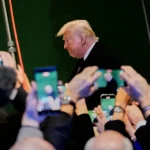
–>
March 24, 2023
Vladimir Putin’s approval rating is 82%. Joe Biden’s is 42%. Xi Jinping’s is anyone’s guess, but the Chinese near-unanimously trust their government. More than half of Russians trust their government. Less than a third of Americans trust theirs. These statistics are not random but speak to America’s imminent loss in this, the Second Cold War.
‘); googletag.cmd.push(function () { googletag.display(‘div-gpt-ad-1609268089992-0’); }); }
The International Criminal Court has issued an arrest warrant for Vladimir Putin for war crimes in Ukraine, and Russians are as proud as ever to be Russian. Meanwhile, American pride is sinking. It has given Ukraine $76.9 billion to fight the second iteration of Russia’s “Evil Empire” in a war increasingly seen as the opening proxy war in Cold War II.
Why aren’t Americans rallying around the flag? Pride, approval, and support for their respective flags in China and Russia, but not the same in America, is not an accident. All governments influence the memories they want their people and foreigners to have of them. It’s called political memory.
A look at how the governments of Russia, China, and the United States are leveraging political memory sheds light on why Russians and Chinese love their governments and rulers, and Americans are souring on America and Biden. This simultaneous occurrence is not an accident. Russia and China are preparing to win the second round of the Cold War, and America is handing them the opportunity to do this.

Image: Putin and Xi. YouTube screen grab.
‘); googletag.cmd.push(function () { googletag.display(‘div-gpt-ad-1609270365559-0’); }); }
The goal of Russia’s political memory is “to give students and ordinary citizens a simple and consistent narrative of a powerful nation they can take pride in.” School begins by singing the national anthem and raising the Russian flag. Taking a knee or disparaging the Russian flag is unthinkable. Putin, to be certain of unified support for the actions taken, restore Ukraine to its rightful place, and prepare for Cold War II, launched a new patriotic history in 2022. Putin described the purpose: “A deep understanding of our history…to draw correct conclusions from the past.”
Russia’s political memory constantly conditions Russians to fear existential threats, particularly from the West. It’s why they revere their militaries and have always been prepared to endure heavy casualties in war. The military prevents the Russian state from being subjugated.
Political memory also instills an unshakable pride in Russia and being Russian, something cemented through glorifying military victories, or at least victory in WWII. The most important holiday in Russia is Victory Day, which honors the end of WWII. Glossed over or censored because they do not instill pride are Russia’s losses in the Crimean War (1853-1856), the Russo-Japanese War (1904-1905), Vladimir Lenin bailing on WWI while hoping to seal victory for the Germans, Stalin’s crimes against humanity, and the 1939 Hitler-Stalin non-aggression pact.
Russia’s political memory, which is more concerned with future security than past moral failings, also has no room for millions starving in government-made famines in the 20th century, including the Ukrainian Holodomor, the enslavement of a third of the people in the Russian Empire until 1861, the 19th- and 20th-century Jewish pogroms and Muslim cleansings, or the 21st century’s inhumanity against Muslim Russian Chechens. These parts of history do not contribute to the goals of Russia’s political memory.
Russia’s approach to political memory is consistent with China’s approach and motivated by the same theme: China lives with a perceived existential threat to its independence, particularly from the west. Cold War II will test its resilience.
China began preparing for round two at the end of Cold War I. This is when it began its “Patriotic Re-education Campaign.” Cementing patriotism in China, as in Russia, is key to preparing for and achieving victory in Cold War II.
‘); googletag.cmd.push(function () { googletag.display(‘div-gpt-ad-1609268078422-0’); }); } if (publir_show_ads) { document.write(“
China’s and Russia’s approaches to political memory are contrary to the U.S. government’s. Instead, America appears to be preparing to wave a white flag, or maybe a rainbow-colored one. Pride in America has been sinking, and this ties to the government’s design for America’s political memory.
This political memory could emphasize things such as America being the first colony to defeat a European empire or its WWII victory over fascism. Or it could tell how, in just over 150 years, America became an economic powerhouse on the back of capitalism and then sustained this with an education system designed to unify Americans and later foster innovation.
Instead, the center of history in 4,500 schools is to depict American slavery via exaggerated interpretations of personal memories, untempered by facts. Instead of a history of patriotism and achievement, the American government is supporting a history of trauma, including systemic racism and inequality. President Trump sanctioned patriotic education to counter American history centered on slavery, an initiative that Biden promptly revoked because it was inconsistent with his strategy for political memory.
In 2022, it was reported that the average IQ of Americans dropped for the first time in 100 years. The researchers speculated that it was due to changes in the educational system. Teachers must trade time that could be spent on “critical thinking, intellectual curiosity, and independent thought”—all essential to innovation, economic growth, and understanding global issues—because of mandates about the time allotted to subjects that support Biden’s strategy for political memory. These include topics such as restorative justice, non-white ethnic studies, the history of slavery, reparations, and ending “negative” aspects of white culture, such as objectivity and ambition.
Besides hindering innovation and economic growth and encouraging racial and ethnic divisions, the government’s strategy for political memory affects our ability to protect America. Search for pride in the military, and the results point to gay pride. While the second and third largest military powers have painted a bullseye on America’s back, America can’t meet its military recruiting goals because the political memory of the military is not American victories but, instead, a history of racism.
Russia and China’s deepening partnership portends a potentially ominous chapter of world history. Anyone familiar with Cold War I knows that more than 20 million died in Cold-War-related proxy wars, so it wasn’t that cold.
The Biden government’s trauma-centered political memory strategy to divide America politically, and racially has motivated this Russo-Chinese partnership and escalated the likelihood of Cold War II. China and Russia have been planning round two since 1991, and a divided America is a tempting target to strike at.
Has anyone ever wondered why China and Russia spend so much propaganda capital on politically and racially dividing America? The answer is that America’s enemies are supporting the American government’s strategy for political memory because doing so, in conjunction with their own hand-crafted political memories designed to unify their countries through patriotic education/propaganda and prepare for Cold War II, is a formula for victory. When is the American government going to admit that its strategy for political memory is a national and global security threat?
<!– if(page_width_onload <= 479) { document.write("
“); googletag.cmd.push(function() { googletag.display(‘div-gpt-ad-1345489840937-4’); }); } –> If you experience technical problems, please write to [email protected]
FOLLOW US ON
<!–
–>
<!– _qoptions={ qacct:”p-9bKF-NgTuSFM6″ }; ![]() –> <!—-> <!– var addthis_share = { email_template: “new_template” } –>
–> <!—-> <!– var addthis_share = { email_template: “new_template” } –>






